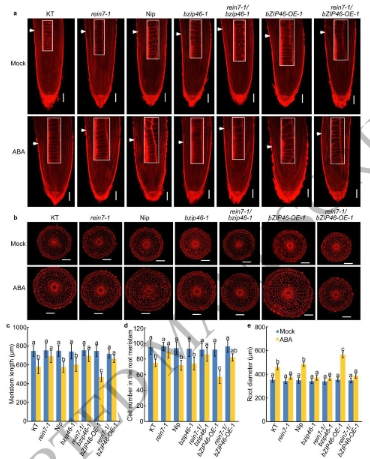Abstract:
Soil compaction is a global problem causing inadequate rooting and poor yield incrops. Accumulating evidence indicates that phytohormones coordinately regulate rootgrowth via regulating specific growth processes in distinct tissues. However, howabscisic acid (ABA) signaling translates into auxin production to control root growthduring adaptation to different soil environments is unclear. In this study, we report thatABA has biphasic cffects on primary root growth in rice (Oryza sativa) through an auxinbiosynthesis-mediated process, causing suppression of root elongation and promotion ofroot swelling in response to soil compaction. We found that ABA treatment induced theexpression ofauxin biosynthesis genes and auxin accumulation in roots. Conversely,blocking auxin biosynthesis reduced ABA sensitivity in roots, showing longer and thinnerprimary roots with larger root meristem size and smaller root diameter. Furtherinvestigation revealed that the transcription factor basic region and leucine zipper 46(OsbZIP46), involved in ABA signaling, can directly bind to the YUCCA8/rice ethylene-insensifive 7 (OsYUC8/REIN7) promoter to activate its expression, and genetic analysisrevealed that OsYUC8/REIN7 is located downstream of OsbZIP46. Moreover, roots ofmutants defective in ABA or auxin biosynthesis displayed the enhanced ability topenetrate compacted soil. Thus, our results disclose the mechanism in which ABAemploys auxin as a downstream signal to modify root elongation and radial expansion,resulting in short and swollen roots impaired in their ability to penetrate compacted soilIhese findings provide avenues for breeders to select crops resilient to soil compaction
Key Words:
abscisic acid, auxin biosynthesis, rice primary root, meristem size, soilcompaction.



